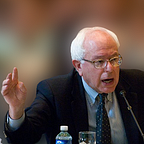Reject the AT&T-Time Warner Merger
Dear Acting Assistant Attorney General Hesse:
I am writing to urge you to block the proposed merger of AT&T Inc. and Time Warner Inc. This proposed merger is just the latest effort to shrink our media landscape, stifle competition and diversity of content, and provide consumers with less while charging them more.
Whether to approve this merger is a critical decision for the Department, but it is even more consequential for our democracy. Our democracy thrives when there is a diversity of viewpoints, and when citizens have unlimited access to information. Analysts have called the proposed deal a “seismic shift” for the media and technology sectors, with a giant telephone company “gaining control over hugely valuable brands spanning television, film, sports, news, video games and mobile and residential Internet service.” As you noted recently when speaking about the corrosive effects of antitrust, “when companies harm competition — choking off competition or agreeing with rivals not to compete — they infect the economy with unfairness by accumulating power that the few can wield at the expense of the broader American public.” This merger represents a gross concentration of power that runs counter to the public good and should be blocked.
Consideration of this deal should receive the utmost scrutiny, particularly because it involves a sector so fundamental to a free democracy. As Public Citizen notes, “this merger aims to concentrate far too much market, communications and political power in one corporation, threatening to impede the free flow of information, undermine the integrity of the Internet, raise consumer prices and further corrupt our politics.” In this particular merger, the diversity of programing would be further diminished by truncating the relationship of content and distribution. When one giant company owns both the content and the means of distribution, there is a clear disincentive to provide additional choices to consumers. In these so-called “vertical relationships,” not only is competition reduced, but there is a heightened, if not insurmountable, barrier to the influx of new content and diverse voices.
Moreover, this proposed deal is likely to allow the CEO of Time Warner to earn hundreds of millions of dollars on the stock and options he has accrued, and to saddle the combined company with upwards of $175 billion of debt it will have to service on the backs of consumers. That would be simply unacceptable.
As we have seen, newly merged companies have used their scale and market power to raise prices on consumers and lower compensation for their competing producers. This deal would almost certainly lead to price hikes and reduced choice. We have seen the effects on consumers play out in AT&T’s 2015 acquisition of DirectTV. AT&T claimed that such a deal would benefit consumers. Less than a year later, these benefits are nowhere to be found, and AT&T raised prices for DirecTV services. We have also seen increased anti-competitive behavior resulting from the AT&T- DirecTV merger. For example, AT&T has exempted its DirecTV service from data caps to customers, in ways that are already arguably a violation of net neutrality principles.
Finally, approving this deal could lead to a wave of other mergers in the media industry. At a time when our telecommunications and media industries are already too concentrated, we should be focused on opening those markets to more competition, not less.
The media and telecommunications landscape is changing. It is important that public policy concerns guide these changes, so that we may preserve our democratic discourse and open competitive markets for speech and commerce. That is the function of our antitrust laws. I ask you to enforce them and block the proposed merger.
Sincerely,
Bernard Sanders
United States Senator
